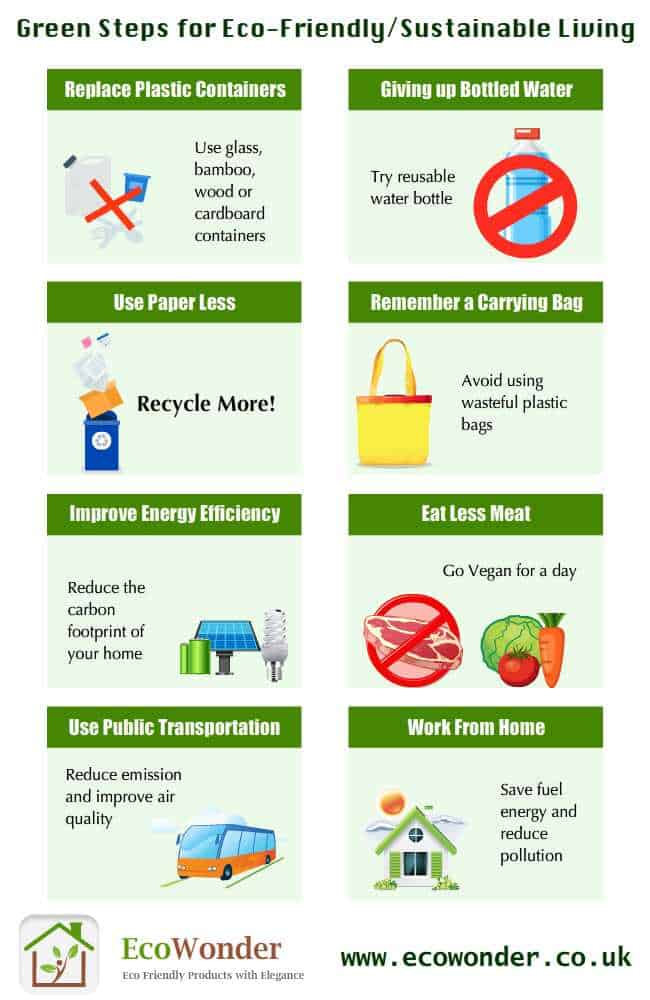With environmental concerns increases, people are becoming more willing than ever before to make changes to their lifestyle but, living eco-friendly isn’t always the easiest, you might feel a little overwhelmed about all the big ideas of saving the planet. But, while large steps like having solar homes or electric cars certainly promise to make a huge difference in the world, there are other more accessible green steps you can apply in your daily life to reduce your carbon footprint and practice sustainable living. Here are some easy and small changes you can make in your everyday life to help live an eco-friendlier lifestyle:
Replace Plastic Containers
Storing food, drink, and sauces in plastic containers is so normal that we don’t even think about alternatives, but there are ways to go green in this category. An easy alternative is to use glass, bamboo, wood, or cardboard containers to replace plastic. Not only will you move toward living eco-friendly, but you’ll also be avoiding any potential harm of being exposed to BPA and other plastic chemicals.
Giving up Bottled Water
Do you know bottled water is one of the least eco things you can consume, and plastic water bottles are the most common plastic found in the garbage! Many of those plastic bottles that don’t get recycled and will have ended up in our landscape. Estimated to have a carbon foot print of around 82.8g for half a litre, any reduction in using them is a major step forward for living eco-friendly. Instead of plastic bottles, give reusable biodegradable fibre or metal water bottles a try. They are extremely eco-friendly and often more stylish.
Use Paper Less and Recycle More
The world we live in today relies much more on computers and other smart devices. It is easy to go a day without using a notebook or even a piece of paper. You can be more environmentally friendly by unsubscribing from unnecessary catalogues and changing for paperless billing and statements from your bank, gas and electric providers. If it is essential for you to use paper at your job or at school, you can still make a difference by recycling the paper you do use. Recycling paper uses less energy and saves more trees that get to fill our forests than by creating ‘virgin’ paper.
Remember a Carrying Bag
While the 5p charge has brought plastic bag use down by 80% in some stores, there are always going to be days when we go shopping, whether it’s for groceries or clothing and forget to bring a reusable shopping bag. I started to bring a tote bag (it folds up real small) with me wherever I go. I have something to store whatever I buy without resorting to using wasteful plastic bags.
Improve Energy Efficiency of Your Home
There are a lot of things you can do to cut down on energy you use in your home. Start by replacing your light bulbs with LED bulbs which can last longer and use much less electricity. Unplug appliances when they aren’t being used, wash all possible clothes on cold and lower your thermostat in the winter. As well as educing your carbon footprint, these steps will also lead to smaller energy bills and more money in your pocket.
Eat Less Meat
Believe it or not, cutting back meat and dairy products from your diet can reduce your carbon footprint by up to 73 per cent. While eating a vegan diet isn’t appropriate for everyone, you can help by choosing to go meatless one day a week or eat more seafood. Less livestock results in a significant drop in greenhouse gas emissions, it would also free up wild land lost to agriculture, one of the primary causes for mass wildlife extinction.
Consider Public Transportation
Using public transportation when it’s convenient is an environmentally friendly mode of getting around. Similar to carpooling, using public transit significantly reduces the average amount of energy used per passenger than a single-occupancy vehicle, and the amount of tailpipe emissions associated with those vehicles. By reducing the amount of emissions in dense urban areas, public transportation can help cities to lower smog, to improve air quality, and to decrease the health risks associated with poor air quality.
Work from home one day a week
The first big benefit when you start working from home is that there is no more commuting to an office needed. In addition, working from home provides the potential to save fuel energy and other resources needed to operate, build, repair, and maintain personal vehicles to decrease. Studies show that if one million people worked from home just one day a week it could eliminate three million tons of CO2 each year. Working from home can also promotes safety by taking commuters off the roadways and offers a renewed opportunity for workers to rediscover the possibilities of working productively from their homes.






